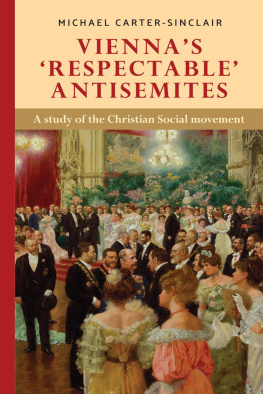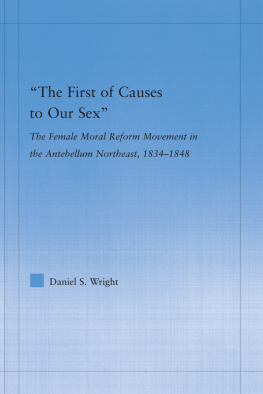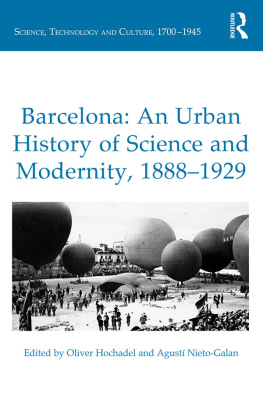SEXUAL KNOWLEDGE
A USTRIAN AND H ABSBURG S TUDIES
General Editor: Gary B. Cohen, Center for Austrian Studies, University of Minnesota
Volume 1
Austrian Women in the Nineteenth and Twentieth Centuries: Cross-Disciplinary Perspectives
Edited by David F. Good, Margarete Grandner, and Mary Jo Maynes
Volume 2
From World War to Waldheim: Culture and Politics in Austria and the United States
Edited by David F. Good and Ruth Wodak
Volume 3
Rethinking Vienna 1900
Edited by Steven Beller
Volume 4
The Great Tradition and its Legacy: The Evolution of Dramatic and Musical
Theater in Austria and Central Europe
Edited by Michael Cherlin, Halina Filipowicz, and RIchard L. Rudolph
Volume 5
Creating the Other: Ethnic Conflict and Nationalism in Habsburg Central Europe
Edited by Nancy M. Wingfield
Volume 6
Constructing Nationalities in East Central Europe
Edited by Pieter M. Judson and Marsha L. Rozenblit
Volume 7
The Environment and Sustainable Development in the New Central Europe
Edited by Zbigniew Bochniarz and Gary B. Cohen
Volume 8
Crime, Jews and News: Vienna 18901914
Edited by Daniel Mark Vyletta
Volume 9
The Limits of Loyalty: Imperial Symbolism, Popular Allegiances, and State Patriotism in the Late Habsburg Monarchy
Edited by Laurence Cole and Daniel L. Unowsky
Volume 10
Embodiments of Power: Building Baroque Cities in Europe
Edited by Gary B. Cohen and Franz A. J. Szabo
Volume 11
Diversity and Dissent: Negotiating Religious Differences in Central Europe, 15001800
Edited by Howard Louthan, Gary B. Cohen, and Franz A. J. Szabo
Volume 12
Vienna is Different: Jewish Writers in Austria from the Fin de Sicle to the Present
Hillary Hope Herzog
Volume 13
Sexual Knowledge: Feeling, Fact, and Social Reform in Vienna, 19001934
Britta McEwen
Volume 14
Journeys Into Madness: Mapping Mental Illness in the Austro-Hungarian Empire
Edited by Gemma Blackshaw and Sabine Wieber
Volume 15
Territorial Revisionism and the Allies of Germany in the World War
Edited by Marina Cattaruzza, Stefan Dyroff and Dieter Langewiesche
Volume 16
The Viennese Caf and Fin-de-Sicle Culture
Edited by Charlotte Ashby, Tag Gronberg and Simon Shaw-Miller
Volume 17
Understanding Multiculturalism: The Habsburg Central European Experience
Edited by Johannes Feichtinger and Gary B. Cohen
Volume 18
Sacrifice and Rebirth: The Legacy of the Last Habsburg War
Edited by Mark Cornwall and John Paul Newman
Volume 19
Tropics of Vienna: Colonial Utopias of the Habsburg Empire
Ulrich E. Bach
First edition published in 2012 by
Berghahn Books
www.berghahnbooks.com
2012, 2016 Britta McEwen
First paperback published in 2016
All rights reserved. Except for the quotation of short passages
for the purposes of criticism and review, no part of this book
may be reproduced in any form or by any means, electronic or
mechanical, including photocopying, recording, or any information
storage and retrieval system now known or to be invented,
without written permission of the publisher.
Library of Congress Cataloging-in-Publication Data
McEwen, Britta, 1973-
Sexual knowledge : feeling, fact, and social reform in Vienna, 19001934 / Britta McEwen.
p. cm. (Austrian and Habsburg studies ; v. 13)
Includes bibliographical references and index.
ISBN 978-0-85745-337-2 (hardcover) ISBN (paperback) 978-1-78533-037-7 ISBN 978-0-85745-338-9 (ebook)
1. SexologyAustriaViennaHistory. 2. Sex instructionAustriaViennaHistory.
3. Social problemsAustria--ViennaHistory. I. Title.
HQ18.A9M35 2012
306.70943613dc23 2011037634
British Library Cataloguing in Publication Data
A catalogue record for this book is available from the British Library
ISBN 978-0-85745-337-2 (hardback)
ISBN 978-1-78533-037-7 (paperback)
ISBN 978-0-85745-338-9 (ebook)
A CKNOWLEDGMENTS

I would like to thank the UCLA Graduate Division and Department of History for tremendous support in the early days of this project. Travel grants from the UCLA Center for the Study of Women, the UCLA Center for European and Russian Studies, and the Berkeley Center for European Studies enabled me to make many trips to central Europe. A Creighton University Faculty Research Fellowship and a Paul Klemperer Fellowship from the New York Academy of Medicine helped me track down several medical sources once back in the United States. I am indebted to the Fulbright Commission of Austria for accepting and supporting my academic interests while in Vienna. Finally, I am grateful to several publishers for allowing me to publish substantially revised and updated versions of research that has appeared elsewhere. Parts of first appeared in two publications: Sharing Sexual Knowledge: A Cultural History of Sex Education in Twentieth Century Europe and North America (London: Routledge, 2009) and Sexualitt, Unterschichtenmilieus und ArbeiterInnenbewegung (Leipzig: Akademische Verlagsanstalt, 2003).
In Austria, I wish to thank the unflagging and suspiciously cheerful staff at the National Bibliothek, who never limited my requests nor blinked at their titles. I am also very grateful to the staffs at the Archive der sterreichischen Arbeiterbewegung, the Gesellschaft der rzte in Wien, and the Stadt- und Landesarchiv for the city of Vienna. I also enjoyed the encouragement of Viennese scholars and feminists Sandra Eder, Maria Mesner, Sonja Niederacher, Karin Riegler, and Annemarie Steidl. Most of all, I wish to thank Gundi Herold, who led me into the Wienerwald every week for constitutionals, language lessons, and loving moral support during my times in Vienna.
In the United States, I am particularly grateful to the members of my dissertation committee and the regular attendees of the UCLA European History Colloquium. I cannot overemphasize my intellectual and human debt to David Sabean; he has been a true









